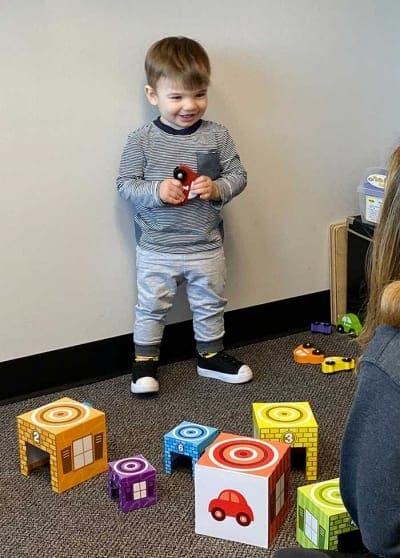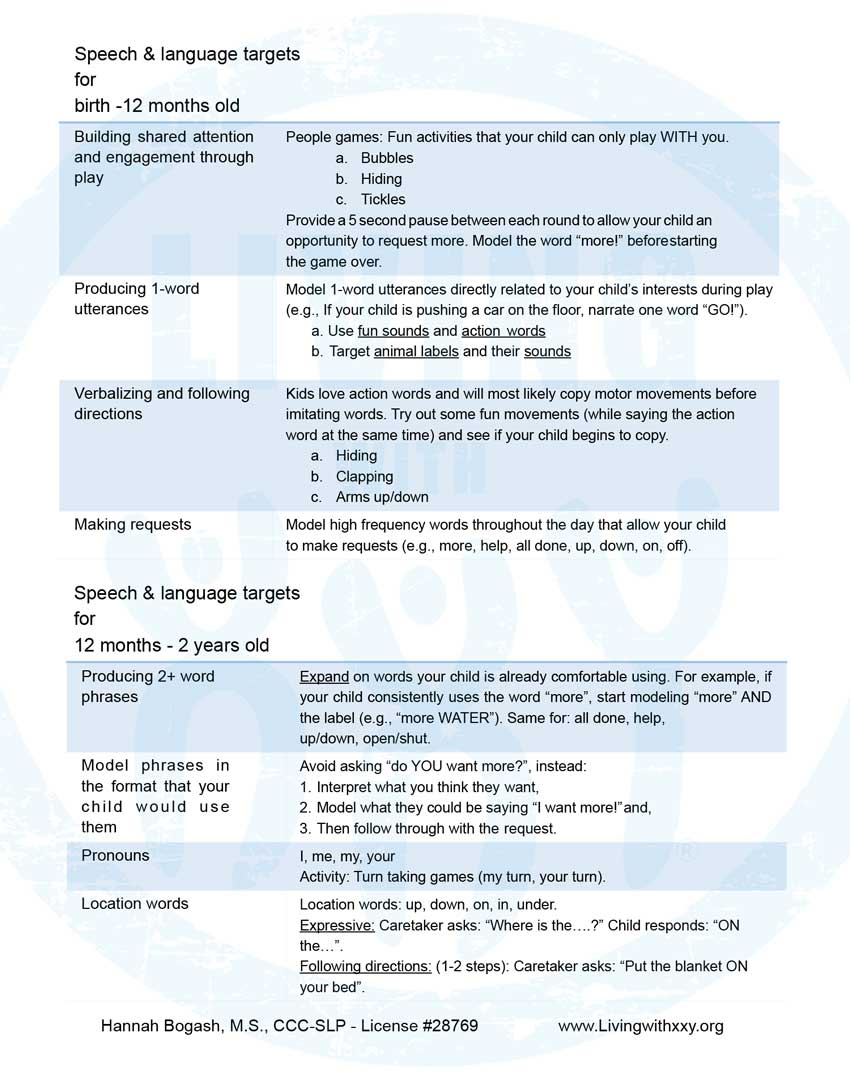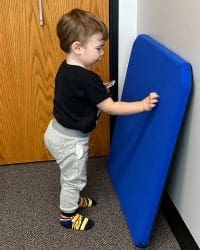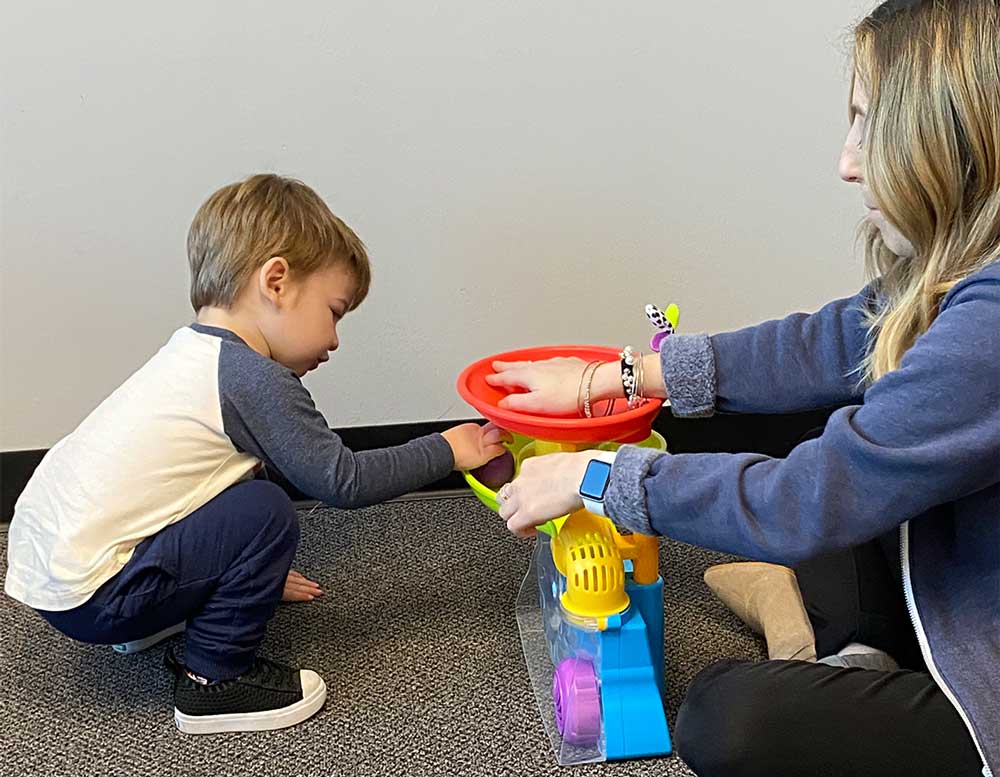“But your son doesn’t sound like he needs speech therapy.” or
“But he’s only 10 months old. What baby talks this early?” or
“If there are no flags, why go to such drastic measures?”
These are just a few of the common questions and remarks we often receive about our early pursuit of speech services for our 10-month old son, Jack, who was diagnosed with Klinefelter Syndrome at birth. Knowing the risks of speech and language delays, commonly present in males with 47 XXY, our family elected for Klinefelter syndrome speech therapy early on. According to the NIH:
Klinefelter syndrome males may experience some of the following learning and language-related challenges (Many of the language and learning difficulties can often lead to social and behavioral symptoms in Klinefelter syndrome):
- A delay in learning to talk.
- Difficulty using language to express their thoughts and needs.
- Difficulty processing what they hear/may take longer to process information.
- Reading difficulties (poor reading comprehension or slower reading)
*Source: https://www.nichd.nih.gov/health/topics/klinefelter/conditioninfo/symptoms
 At 8-weeks old, Jack began weekly occupational and physical therapy sessions, which yielded many benefits including improved gross & fine motor skills, endurance, balance, and coordination. We watched Jack progress well as he continued to surpass milestones ahead of schedule. We had Jack evaluated at 10 months for speech therapy, but it was still too soon. Shortly after Jack turned 1, we had him reevaluated. It was in August of 2019 when we met, Hannah, Jack’s speech therapist, who would quickly become one of his earliest cheerleaders and advocates.
At 8-weeks old, Jack began weekly occupational and physical therapy sessions, which yielded many benefits including improved gross & fine motor skills, endurance, balance, and coordination. We watched Jack progress well as he continued to surpass milestones ahead of schedule. We had Jack evaluated at 10 months for speech therapy, but it was still too soon. Shortly after Jack turned 1, we had him reevaluated. It was in August of 2019 when we met, Hannah, Jack’s speech therapist, who would quickly become one of his earliest cheerleaders and advocates.
Like Jack’s other therapy services, we established good relationships with his therapists. This was especially important for all parties involved. The early intervention life is a significant commitment and comes with sacrifice, time, finances, and effort. My husband and I chose a rather aggressive approach to Jack’s care in his first two years of life, including all of his therapy services. We have committed to 2x week Klinefelter syndrome speech therapy sessions, each being 30 min. The frequency of visits can feel like a lot but is effective. Admittedly, there are days when I roll into Hannah’s office looking like a complete hot mess just trying to make it on time (hello 405 traffic). But when we witness the wheels beginning to turn in Jack’s brain or his vocabulary expanding or seeing breakthroughs in his communication, it makes every activity or session worth it. Today, as Jack approaches his 2nd birthday, we are incredibly proud of our boy and his newfound abilities in making requests, counting, identifying objects, naming his shapes, colors, and animals, etc. So, I guess, just like the other areas of therapy, we start early and often. This has made all the difference.
Another important element of our relationship with Jack’s speech therapist is viewing it as a partnership. We don’t rely on Hannah to do all the work for Jack and for the US (This would be the easy way out and wouldn’t be in Jack’s best interest). As Jack’s parents, we are his biggest advocates. No one told us clearly that we had to enroll Jack in any of his early intervention services, like Klinefelter syndrome speech therapy. No one followed up with us. We did our own research, asked many doctors for opinions, and decided ourselves to commit to this path. When we met Hannah, we knew right away that she was a great fit for Jack. We look to Hannah as our partner, teacher, and coach. I attend every single session and observe for the first 25 min. Usually, we wrap up the last 5 minutes with takeaways, at-home exercises, and targets. I then work with Jack throughout the week at home, replicating the exercises or trying out similar ones. We weave these exercises into our normal play throughout the day, so it never actually feels like “homework.” Sitting on the sidelines and relying on the therapist to do all the work for your child at sessions will not produce the optimal results most parents would hope for. I encourage parents to get involved, become an active participant, and build the confidence to stay consistent with the exercises at home. With practice, you will learn what your child needs and can explore creative ways to give them those opportunities to grow & learn. That is where the real work is found.
Ok, so I realize some of you reading this right now may have different circumstances that would interfere with this level of Klinefelter syndrome speech therapy for your son. It could be a work schedule, a time issue, multiple children in the home, finances, insurance, lack of nearby resources, disqualification, or other personal reasons standing in the way. Having weekly in-person sessions is excellent and I encourage parents who are able, to pursue these services early on during the formative years in their son’s life. However, there are many ways you can model these exercises at home while playing with your child. If you google at-home speech therapy activities, you can find a plethora at your fingertips. At Living With XXY, we are not here trying to push a “one-size-fits-all” approach. We realize every single individual living with XXY is unique and may fall somewhere differently on the spectrum in terms of needs, strengths, challenges, and circumstances. This is why we are partnering with professionals like Hannah, to bring some practical at-home exercises you can try out with your little ones. Hannah has created a “Speech & Language Targets” chart for boys (birth-2 years old). This chart just so happens to be the targets we have worked on together for Jack. I have witnessed Jack firsthand, progress through each target. We hope this chart will inspire, motivate, and empower you to push your son to reach & exceed his early potential.

If you have specific questions about the targets or need further elaboration for Klinefelter syndrome speech therapy, please contact me at [email protected]. Additionally, we are always looking to hear success stories and experiences from other families so we can learn and grow together.
Ok, so now my own best advice for parents choosing the early intervention life:
- Start Early
- Once diagnosed, start your research in securing an evaluation for your son. Ask your pediatrician for a referral or recommendation in your area.
- Some services are covered by insurance, some are out of pocket, and others may be funded through a program depending on your region. It is helpful to explore your options prior to beginning any services.
- Your son may not show any “red flags” or may not be near talking, but I would encourage you to start close to your son’s 1st birthday or shortly after. There is so much work that goes into Klinefelter syndrome speech therapy beyond just “words.” The foundational work has made all the difference.
- Repetition is Key!
- Speech is all about repetition, repetition, repetition. I compare Jack to a sponge, absorbing just about anything and everything we say or do. The exercises may seem redundant and at times, ineffective, but be patient! Your son will have many “ah-ha!” moments and witnessing it can be incredibly rewarding.
- If you can do weekly sessions, awesome! Jack sees Hannah 2x week and knows the drill—he leads me up the elevator, walks ME down the hallway, opens the door, and knows it is time to work. We’ve created a fun routine of going to “school.”
- The frequency can be exhausting and constantly being “on” as a parent/caretaker/advocate doing this early intervention life can feel draining. Remind yourself this intensity level will not last forever and that your son will greatly benefit from this incredible gift.
- Narrate!
- Hannah taught us to “narrate” Jack’s interests. We bombard him with verbal models and interpret what we think he wants. Even though your son may not be ready to use words or respond, ask him LOTS of questions while you are doing things together throughout the day. It sounds like common sense but simply TALK to your child and model everything, whether changing his diaper, giving him snack options, or showing him how to clean up his toys.
- It helps to take on a child-led play approach, where your child directs his own process of learning and play. Instead of forcing Jack to do what we think he wants to play with, we provide a few options and let him choose. Whatever piques his interest, we home in on and build activities around that. Once he is “all done” (he has learned to signal this through sign language and words), we move on to another activity after cleaning it up together. If he wants “more” (signing + words), we continue.
- Partnership & Education
- As I mentioned above, become an active participant in your son’s early intervention services. Look to your therapist as a partner and coach. Be willing to ask questions, take notes, and model throughout the week for your child.
- Educate those your son maybe around—this may be partners, siblings, grandparents, nannies, caretakers, etc. Provide them with clear directions and exercises they can do with your son to aid in participate and help normalize the activities. As your son gets older, you will see how proud they are to accomplish tasks around loved ones.
- Be PATIENT & CELEBRATE
- Some weeks, we have seen zero progress while other times, we are amazed at major breakthroughs with Jack’s therapy. His progress often arrives in clusters. During the thick of it, it is easy to get tired, unmotivated, or discouraged. Your son will have some excellent and not-so-excellent days—there have been many days where getting to a speech appointment on time is a miracle in itself. Hang in there!
- Don’t forget to celebrate all the little victories. When Jack would have an especially good week or accomplish a new target, we would celebrate by taking him out to dinner, offer him a special dessert, or have a dance party in the living room. Make it fun! Your son is working hard and deserves to be celebrated every day.
- Remind yourself this level of therapy is temporary but will produce many benefits for your son’s overall development. The work you put into him is one of the greatest gifts and can set the stage for the trajectory of his incredible life ahead.

If you’re reading this, chances are you care a lot about that special XXY boy in your life. For that, we applaud you! This journey isn’t always easy and certainly doesn’t come with a step-by-step manual. I think most XXY parents wish this journey were black & white. As I’ve said before, we’re nowhere close to being experts in terms of parenting or perfect advocacy. However, time and time again, we are realizing that we are Jack’s best advocates and we rely on outside experts for that additional support. Our team at Living With XXY hopes you find value in this at-home guide as it is intended to help spark more learning opportunities and discover what works best for your son and family. Again, you were hand-picked to parent your incredible son best. We believe in you and are cheering you on as we create a brighter future for our boys, families, and community.
-Marci (Jack’s Mom)




Marci, such an inspiration! Very informative and I am confident encouraging to all that reads this. So proud of you and Matt. Grateful for the xxy amazing team. Thank you💙 Nene ( Jacks grandmother)
I was wondering if anyone received EHT treatment after 1 year of age? I have an almost 1 year old and he hasn’t met many of his milestones (I.e. doesn’t crawl, etc). Did Jack receive EHT and did it help?
Thank you for writing about your beautiful family. I’ve been struggling to figure things out with my son. It’s difficult while there’s a pandemic to get help from other people including early intervention. Everything is done over the phone which is less than optimal.
Thank you. My son is only 3 weeks old and we have PT OT and endocrinologist lined up in the next few weeks to start therapy. I read your blog a while back and made the decision to follow your footsteps with regards to starting early. I had already decided before hand that early intervention is the key but did not really know how early. Now thanks to your blog I’ve made the decision. My son starts PT at 8 weeks old and OT a bit later due to waiting list. However I have found an App called Baby Sparks. We follow 5 different exercises that consists of cognitive, speech, motor skills exercise and we do this at least 5 mins each day.
You are such an inspiration.My son is 8 months old and we are just beginning to get the wheels rolling for early intervention.Thank you so much for sharing your story it has given me many ideas and loads of encouragement..